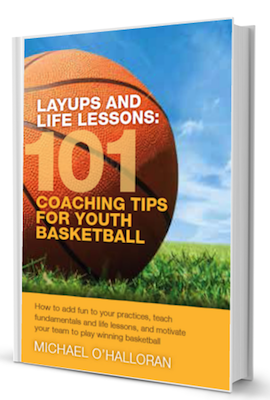If you’re coaching a youth basketball team, you can pass on some of your wisdom to players. Look for opportunities throughout the season, during practices and games, to communicate important messages. Here’s a sampling for your consideration:
BASKETBALL LIFE LESSONS
The game of basketball can teach important life lessons.
Hard work and purpose lead to success.
When a player or the team puts in extra work individually, and the results pay off on the court, what better time is there to communicate this message? Think of this message on the basketball court and in the classroom.
It’s important to take chances because that’s how we grow and get better.
Players at all levels can quickly fall into a pattern of only using skills they’re most comfortable with. Younger players might only dribble with their strong hands. Encourage your players to take chances and reward the effort even if the result is less than optimal.
“Inch-by-inch, life is a cinch; yard-by-yard, life is hard.”
Challenges are easier when taken in bite-size chunks. By getting a little better every day, the process is more comfortable than if you try to make a drastic improvement in one practice. It’s a good message for players to understand to try their best at every practice.
Winning and losing with grace.
In basketball, as in life, players will not always come out on the winning side. Learning how to deal with one’s emotions immediately after losing a close game is an important experience for players, even if it doesn’t feel too good. Players can also learn how adjustments made in practice after losses can positively impact future games.
Don’t quit.
Whenever your team comes from behind and secures a victory, it provides a great opportunity to reinforce an important message: never quit.
The power and magic of teamwork – everyone makes a difference!
The best teams work together as a unit on offense and defense. It’s not all about scoring and rebounding — every player finds a way to contribute.
Getting along in a group.
When working with a group, there will usually be some people you get along with better than others. Maybe because of similar backgrounds or interests, some players will make immediate connections with some and not so much with others. Basketball teams provide players opportunities to work together, even with others they may not necessarily like (at least at first).
Making good decisions.
I recently listened to a basketball expert who said that when a player has the basketball, they frequently make about 10 – 15 decisions in their head every 20 seconds, e.g., Should I pass, dribble, or shoot? If I pass, who to? What kind of pass? How hard? Should I fake first? What should I do if I pass? The game of basketball forces players to make decisions. Some players learn from what the coaches say; for other players, it takes experience.
Preparing and meeting challenges.
How do you get ready for big opponents? Do you prepare a written plan, put in extra effort, and maximize your practice time? If a coach makes the connections, it’s easy for players to see that preparation for a tough, cross-town rival in basketball is not dissimilar to preparing for a tough math test. Both take a plan, extra effort, and commitment.
By Mike O’Halloran
Mike has coached basketball for 15 years and has written four books on youth basketball coaching.
Excerpted from Mike O’Halloran’s Layups and Life Lessons: 101 Coaching Tips for Youth Basketball
Also, check out the new MVP Offseason Workouts for baseball, basketball, and softball.

